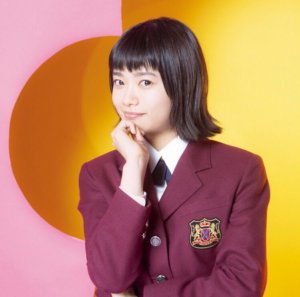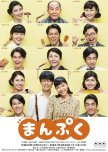This review may contain spoilers
"As long as we're alive, there's hope"
"Manpuku" is the ninth asadora that I've completed so far. I'd actually downloaded and started this drama early on during this journey, but I ended up putting it on hold because I was tired of WII stories at the moment. Week 2 was also surprisingly heavy for this asadora being mostly a comedy. I was able to pick it back up pretty easily and honestly the WII part wasn't as long as I was expecting. "Manpuku" was also one of the asadoras I watched for "Natsuzora" as Sakura Ando has a small voice cameo in it. Another note: Sakura Ando previously appeared in my [thus far] favorite asadora "Ohisama."
Now on to the meat and potatoes. "Manpuku" is one of those "couple" asadoras, meaning that a couple are the lead characters instead having just a female lead. As such, I think the drama has a very different flavor to most other asadoras. Fukuko (Sakura Ando) doesn't have an aspiration like the traditional asadora heroine. Instead, she's there to support her wacky inventor husband Manpei (Hiroki Hasegawa). I don't think this is actually a bad thing but it's not what people are typically expecting from an asadora. As a couple, they're very cute together though Manpei irritates me a bit. While it's obvious how much he needs Fukuko, it's not exactly obvious why Fukuko needs him. But I suppose there's no logic in love [lol]. Anyway, what I'm trying to say is that the dynamic is one-sided. I've heard similar complaints about "Gegege no Nyobo" [which I haven't watch], and ironically Nao Matsushita appears in both.
"Manpuku" is a fictionalized account about the inventor of instant ramen, Momofuku Ando. Everyone has eaten instant ramen and, being American, I didn't know for a long that there was a different way to eat ramen. I wasn't immediately sold on this premise, but I was surprised how I invested I got once we finally got around to it (a little over halfway through I believe). The process of inventing something was shown in the previous asadora "Hanbun, Aoi," but "Manpuku" really goes into it and several times over since Manpei gets involved in numerous endeavors. If you can believe it, I shed some tears at the end over the invention of Cup Noodles.
As for the side characters, my favorite is Fukuko's mother, Suzu-san (Keiko Matsuzaka). I love her so much. She in my opinion has the best comedic moments in the drama, particularly when she's paired with Fukuko or Manpei. The rest of the cast was also great, but by the last few weeks it seemed that the writers were unsure of what to do with them. For example, Fukuko's niece Taka (Yukino Kishii) graduates from college during the eight-year time skip but simply becomes a housewife and mother afterwards. There's nothing wrong with being a housewife but I just thought it was boring that we only see her and her mother Katsuko (Nao Matsushita), Fukuko's sister, just sitting around the TV. I also have a small complaint about Taka's sister, Yoshino (Mai Fukagawa). They made a big deal about which man she was going to marry, but didn't show it playing out. Instead, they just revealed it randomly after the final time-skip.
All-in-all, I don't have many complaints about "Manpuku." I think it's a solid comedic asadora and just an all-around good time. Not *the* best, of course. It's a little towards the end, and Manpei and Fukuko have just a few too many hardships. However, I believe most asadora fans will enjoy this one and it being a comedy makes it easy for a beginner to watch. A final bit of trivia: "Manpuku" ends in 1971 and mentions the Osaka world's fair and the previous asadora "Hanbun, Aoi" begins in 1971 and also mentions the world's fair.
Now on to the meat and potatoes. "Manpuku" is one of those "couple" asadoras, meaning that a couple are the lead characters instead having just a female lead. As such, I think the drama has a very different flavor to most other asadoras. Fukuko (Sakura Ando) doesn't have an aspiration like the traditional asadora heroine. Instead, she's there to support her wacky inventor husband Manpei (Hiroki Hasegawa). I don't think this is actually a bad thing but it's not what people are typically expecting from an asadora. As a couple, they're very cute together though Manpei irritates me a bit. While it's obvious how much he needs Fukuko, it's not exactly obvious why Fukuko needs him. But I suppose there's no logic in love [lol]. Anyway, what I'm trying to say is that the dynamic is one-sided. I've heard similar complaints about "Gegege no Nyobo" [which I haven't watch], and ironically Nao Matsushita appears in both.
"Manpuku" is a fictionalized account about the inventor of instant ramen, Momofuku Ando. Everyone has eaten instant ramen and, being American, I didn't know for a long that there was a different way to eat ramen. I wasn't immediately sold on this premise, but I was surprised how I invested I got once we finally got around to it (a little over halfway through I believe). The process of inventing something was shown in the previous asadora "Hanbun, Aoi," but "Manpuku" really goes into it and several times over since Manpei gets involved in numerous endeavors. If you can believe it, I shed some tears at the end over the invention of Cup Noodles.
As for the side characters, my favorite is Fukuko's mother, Suzu-san (Keiko Matsuzaka). I love her so much. She in my opinion has the best comedic moments in the drama, particularly when she's paired with Fukuko or Manpei. The rest of the cast was also great, but by the last few weeks it seemed that the writers were unsure of what to do with them. For example, Fukuko's niece Taka (Yukino Kishii) graduates from college during the eight-year time skip but simply becomes a housewife and mother afterwards. There's nothing wrong with being a housewife but I just thought it was boring that we only see her and her mother Katsuko (Nao Matsushita), Fukuko's sister, just sitting around the TV. I also have a small complaint about Taka's sister, Yoshino (Mai Fukagawa). They made a big deal about which man she was going to marry, but didn't show it playing out. Instead, they just revealed it randomly after the final time-skip.
All-in-all, I don't have many complaints about "Manpuku." I think it's a solid comedic asadora and just an all-around good time. Not *the* best, of course. It's a little towards the end, and Manpei and Fukuko have just a few too many hardships. However, I believe most asadora fans will enjoy this one and it being a comedy makes it easy for a beginner to watch. A final bit of trivia: "Manpuku" ends in 1971 and mentions the Osaka world's fair and the previous asadora "Hanbun, Aoi" begins in 1971 and also mentions the world's fair.
Was this review helpful to you?

























